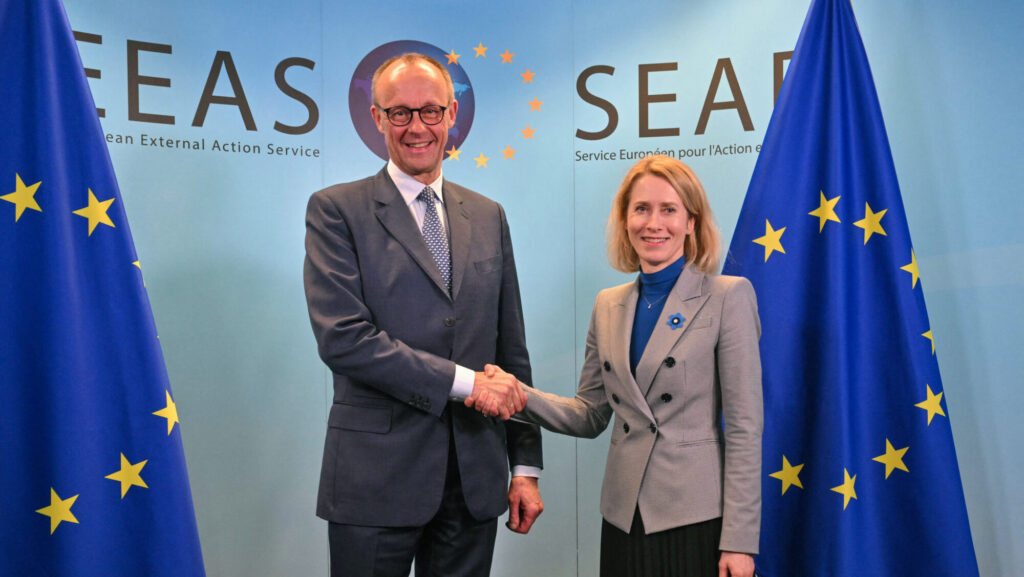
Friedrich Merz and EU High Representative for Foreign Affairs and Security Policy Kaja Kallas
NICOLAS TUCAT / AFP
Friedrich Merz, leader of Germany’s CDU, has become Brussels’ new beacon of hope, and the European elite is already treating him as Germany’s future chancellor. The European capital yearns for German stability and leadership following a period marked by Olaf Scholz’s unstable coalition. Brussels needs a strong Berlin that is aligned with the European agenda to advance on key issues such as defense, economy, and revising fiscal rules. Never mind what the German people wanted: the number one priority for the CDU-dominated Commission is having a reliable ally to foster its self-destructive agenda.
However, despite this unanimity around Merz, the German political reality poses profound challenges that could result in a fragile and turbulent government. Many voices are already anticipating elections by 2027, as the CDU, but especially the SPD have performed abysmally at the ballots with one of the worst results in their history, thus having a very weak mandate to govern in the first place.
Before even forming the government, Merz’s current priority is a constitutional overhaul in Germany to allow more flexibility to the rigid debt brake, specifically exempting defense spending that exceeds one percent of GDP—which is only possible by moving quickly to bypass the recent election results. Brussels’ strategic priorities are directly driving this historic change. It aims to create a domino effect, encouraging center-right parties and social democrats in other European countries to form grand coalition governments, thus keeping the EU establishment permanently in power.
This Brussels strategy is no surprise. Currently, Germany—specifically the CDU—holds decisive influence within the structures of the European Union. Nationally, Merz’s rise to the chancellery is taken for granted. At the European level, the CDU exercises power through Manfred Weber, leader of the EPP in the European Parliament, and Ursula von der Leyen, president of the European Commission, both party colleagues of Merz. This power triangle allows Germany to advance its political and economic priorities across the continent, especially while France faces uncertainty and internal political weakening.
However, Merz’s ascent to power is far from simple. His electoral victory has brought significant commitments. The planned coalition with the Social Democrats (SPD), traditionally rivals but now obligatory partners, has led to ideological tensions within the CDU that are difficult to reconcile. Additionally, party members have criticised this proposed alliance, accusing Merz of betraying conservative principles, especially in economic matters. According to a critical statement by the CDU’s youth leader, “This is a clear defeat for conservatives right from the beginning of the coalition negotiations.”
The budget agreement with the SPD, which includes a special fund of 500 billion euros for infrastructure over ten years, seeks to appease critical voices from both the Left and the Right. But precisely therein lies its greatest weakness: it will depend on the support of the Greens, who could severely obstruct or attach conditions to this agenda in the German parliament, where a qualified majority is required for constitutional amendments. This implies that the stability promised by Merz relies on highly uncertain external compromises. It is also worth noting the well-known disdain the CSU—the CDU’s Bavarian sister party—holds towards the Greens. The CSU blames them for severely harming the automotive industry, a fundamental pillar of Bavaria’s economy.
Moreover, relaxing Germany’s debt ceiling could encourage similar moves in countries like Italy or Spain, and it might also lead to fiscal instability and political resistance in more frugal northern countries, creating new divisions within the EU.
The great paradox is that Europe needs a strong and stable Germany due to the Single Market’s economic system—yet the price of that stability would be to weaken Merz internally, forcing him to balance uncomfortable alliances and challenging constitutional compromises. Alternative für Deutschland (AfD), led by Alice Weidel, could reap the fruits of this looming CDU crisis. And it won’t be because she didn’t warn them in time. As is the case in other Western European countries, the center-right in Germany is still reluctant to endorse genuinely conservative policies, and continues to ally itself with liberals and socialists.
